Multiple Choice
Identify the
choice that best completes the statement or answers the question.
|
|
|
1.
|
Which linear system has the solution x = 8 and y = 2.5?
a. | 2x + 2y = 21
2x – 2y = 11 | c. | 2x +
2y = 8
x – y = 21 | b. | x + 2y = 8
2x –
4y = 16 | d. | x + 3y = 22
2x – y =
10 |
|
|
|
2.
|
Which graph represents the solution of the linear system: –3 x
– y = –5 4 x – y =  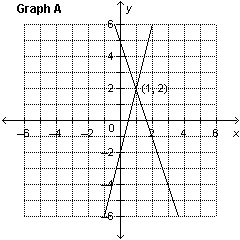 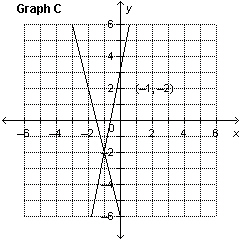 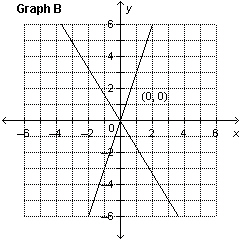 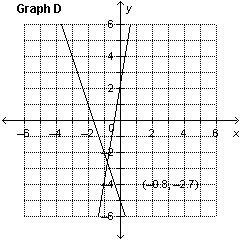 a. | Graph A | c. | Graph C | b. | Graph B | d. | Graph D |
|
|
|
3.
|
Two life insurance companies determine their premiums using different
formulas: Company A: p = 2 a + 24 Company B: p = 2.25 a + 13, where
p represents the annual premium, and a represents the client’s age. Use the
graph to determine the age at which both companies charge the same premium. 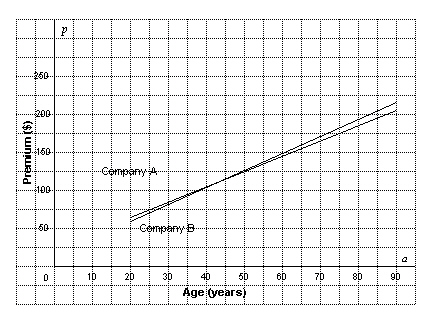 a. | 62 years | b. | 24 years | c. | 59 years | d. | 44 years
|
|
|
|
4.
|
Express each equation in slope-intercept form.
–2x + 4y =
68
13x + 4y = 284
|
|
|
5.
|
Express each equation in slope-intercept form. x +  y = y =
–83 12 x + 4 y = –1772
|
|
|
6.
|
Create a linear system to model this situation:
A rectangular field is 35 m
longer than it is wide. The length of the fence around
the perimeter of the field is 290
m.
a. | l + 35 = w
2l + 2w = 290 | b. | l = w
+ 35
2l + 2w = 290 | c. | l = w + 35
l + w =
290 | d. | l = w + 35
lw = 290 |
|
|
|
7.
|
Write a linear system to model this situation. Then verify which of the given
solutions is correct. A crate of 32 grapefruit has a total mass of 4.648 kg. When 9 grapefruit
are removed, the total mass is 3.622 kg. Verify the mass of the crate and the average mass of one
grapefruit. A.  B. B.  C. C.  D. D.  i) i)
The crate has a mass of 1 kg, and the mass of one grapefruit is
114 g. ii) The crate has a mass of 1.2 kg, and the
mass of one grapefruit is 114.2 g. iii) The crate has a mass
of 1 kg, and the mass of one grapefruit is 114.2 g. iv)
The crate has a mass of 1.2 kg, and the mass of one grapefruit is 57 g. a. | Part A-i | c. | Part B-iii | b. | Part C-ii | d. | Part D-iv |
|
|
|
8.
|
Which linear system is represented by this graph? a) x –
y = 5
5x + 6y =
18
b) x – y =
7
5x + 6y = 18
c)
x – y = 9
6x + 6y =
18
d) x – y = 11
6x + 5y = 18 | 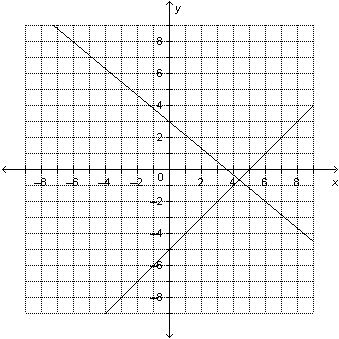 | | |
a. | System d | b. | System b | c. | System a | d. | System
c |
|
|
|
9.
|
Which linear system is represented by this graph? a) 2x –
5y = –16
x =
1
b) 2x + 5y = 16
2x – 5y =
16
c) 2x – 5y = 16
x –  y = y =
–1
d) 2x + 5y = 16
x = –1
| 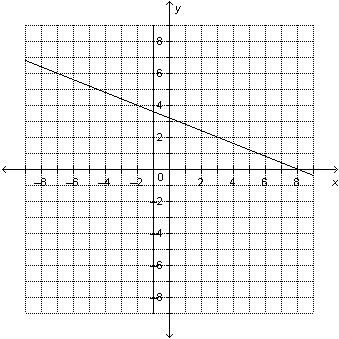 | | |
a. | System a | b. | System d | c. | System b | d. | System
c |
|
|
|
10.
|
Determine the solution of the linear system represented by this graph. a) (3, 5.3)
b) (5.3, 3)
c) (
5.3, –3)
d) (–4, 5.3)
| 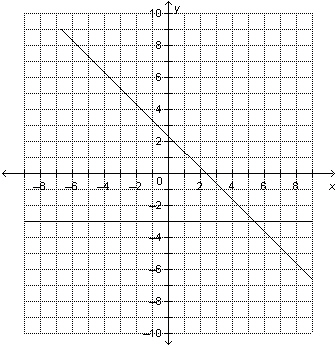 | | |
|
Short Answer
|
|
|
11.
|
Quincy used this linear system to represent a situation involving a collection
of $5 bills and $10 bills:
f + t = 70
5f + 10t = 575
a)
What problem might Quincy have written?
b)
What does each variable represent?
|
|
|
12.
|
Create a linear system to model this situation:
The cost of admission to the
museum is $5.50 for adults and $3.50 for students.
Yesterday, 100 admissions were sold, and the
receipts were $424.00.
|
|
|
13.
|
Solve this linear system by graphing. –3 x – 2 y =
16 – x + y = –8 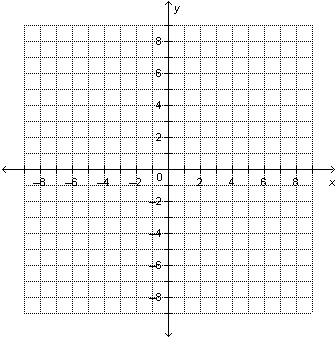
|
|
|
14.
|
Use graphing technology to solve this linear system.
Where necessary, write
the coordinates to the nearest tenth.
–3x – 5y = 12
–x
+ y = –10
|
Problem
|
|
|
15.
|
a) Write a linear system whose solution
is: x = 5, y = –5.
b) Is there more than
one linear system with this solution? Explain.
|
|
|
16.
|
a) Write a linear system to model this
situation. Mrs. Cheechoo paid $155 for one-day tickets to
Silverwood Theme Park for herself, her husband, and 3 children. Next month, she paid $285 for
herself, 3 adults, and 5 children.
b) Use a graph to
solve this problem: What are the prices of a one-day ticket for an
adult and for a child?
|
|
|
17.
|
a) Write a linear system to model this
situation: A large tree removes 1.5 kg of pollution from the air
each year. A small tree removes 0.04 kg each year. An urban forest has 1650 large and small trees.
Together, these trees remove 1818 kg of pollution each year.
b)
Use graphing technology to solve this problem: How many of each size of tree are in the
forest?
c) Verify the solution.
|